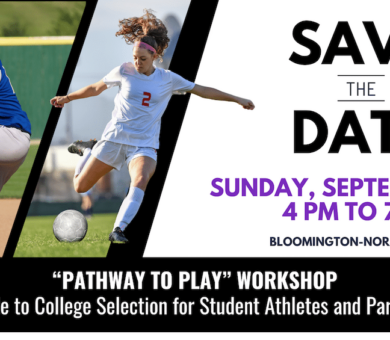Equipping Your Daughter for the College Student Athlete Experience
How do parents know if their daughters are prepared for college athletics? Most parents just assume their athletes are equipped “enough” or will soon be equipped once they get into college and begin the adjustment period.
You can help her prepare now for what comes later, when she enters the world of college athletics.
What is shown most in college sports is the competition. Fans can watch their favorite teams on television or on the internet. There is very little shown, or known, about the everyday grueling schedule that athletes manage year after year.
Student athletes are uncomfortable as they make the adjustment from high school to college. This transition is not easy. For some student athletes, the most challenging year is the first year. For others, it’s year two. What’s more, others feel like they don’t get a handle on this adjustment until they are seniors. Everyone adjusts differently.
Once your daughter gets through the adjustment period, things go much smoother. Here are some things you might get phone calls about while she is going through the transition from high school to college:
- She is homesick.
- She doesn’t feel like coach likes her.
- She isn’t getting the playing time she was expecting.
- It is harder than she expected.
- She is struggling with keeping up with school.
- Her body is sorer than it ever was in high school.
- She gets injured.
- She doesn’t have time to get it all done.
- She got her first bad grade.
- She was yelled at by the coach.
- She feels like the players don’t get along.
- She doesn’t like her dorm roommate.
- She wants to quit.
- She wants to transfer.
This behavior is normal. College is hard. To be honest, there is no way to fully prepare her for college, but you can get close. There will be some adjustments. Expect it.
To give your daughter a better understanding of what she may be getting herself into, here are some things you can do now to help her prepare for later.

Communicate With Her About College
It sounds cliche, but communication is key. Talking about college sports and college recruiting in an open, two-way dialogue allows all emotions and feelings to remain on the table for discussion.
Knowing what to expect is like studying for a test. The more you know beforehand, the better your odds of doing well on test day. While you and your daughter learn more about college sports and the recruiting process, continue to communicate and share ideas and thoughts with each other.
Make Sure This Is What She Wants
If your daughter understands what she is getting herself into, she will be better prepared when the hurdles and obstacles present themselves in college.
Does she absolutely love the sport she plays? This is an important question when it comes to playing college sports. She already feels like she spends a lot of time on her sport in high school, but it will be much more intense with more hours when she gets to college. Her daily schedule will be packed.
Will she want to spend 75-80% of her college experience with academics and her sport? This includes:
- Papers
- Homework
- Lots of reading
- Labs
- Group projects
- Exams
- More reading
- Study Hall
- Academic meetings with team academic advisors
- Meetings with Tutors
- Games
- Practices
- Conditioning and extra training
- Community service
- Booster events
- Speaking engagements and other events
- Supporting other sports teams at the college
That leaves 20-25% for time with friends, family and downtime. It will be a crunch until she is able to handle the workload. Each year should become a little easier in terms of handling the schedule.
Back to the original question, does she love it? If so, she’ll be fine. If not, she will have a difficult time with the adjustment.

Encourage a Good Work Ethic
This is a tough one because when parents harp on their children about working harder it usually does not sit well. What your daughter does not want is another coach, especially when she is not in practice. Therefore, “encouragement” is key.
Encourage her commitment to hard work. Praise her for getting up and running in the morning if that is what she does. Find things you can do with her, such as fun runs or walks. Expose her at an early age that working out and being in shape is a good thing.
Praise working hard in the classroom as well. The strong work ethic has to go beyond sports because college academics will also be very challenging, on top of the intensity of the already demanding sport. Encourage her to read a lot. There is a ton of reading in college and it is not unusual to have to read 50-100 pages per night for certain classes. Demonstrate to her that you value her education.
Try to model a great work ethic. She will learn from you.
Encourage Her to Ask for Help
Asking for help is not a bad thing. It shows maturity and courage. Your daughter may not know this.
Athletes are supposed to be the strong ones, mentally and physically. Many athletes think they should be strong enough to handle life on their own. They see strong athletes on television and follow them on social media.
In polling many college coaches and asking what their main concerns are for their current teams, the number one concern is mental health. There is a lot of pressure on athletes to perform in their sport, keep their grades up and be stand up citizens who stay out of trouble. There is little room for mistakes. College coaches, administrators and fans expect student athletes to adhere to these principles.
College will be overwhelming at times for your daughter. When these overbearing times present themselves, asking for help is important. Figuring out how to overcome obstacles is part of growing up, but she doesn’t have to do it alone.
It will be easier if she knows she can ask for help.

Allow Her to Fail
Many parents have been known to step in front of their daughter when things get rough. They love their daughter so much that they want to protect her. This is even more prominent with parents who have daughters as opposed to sons.
Fighting your daughter’s battles is a disservice to her in the long run. If she never learns how to handle conflict and obstacles, she will have a hard time in college.
What is more effective than fighting the battles for your daughter is to encourage her through the battles and then help her learn to “bounce back.”
Bounce ability, which is the ability to rebound after disappointment, hardship or a loss, is key to an athlete’s adjustment in college. She will need this skill in order to get through the adjustment period. Even more importantly, she will need this skill to make the adjustment into the “real world” after graduation from college.
Helping her bounce back from whatever challenges happen in high school is a huge advantage and something you could start immediately with her. Here are some examples to think about:
- When she plays poorly, do you critique her or do you encourage her for the next game?
- When she gets a bad grade but really studied for the exam, do you tell her she obviously didn’t study hard enough, or do you find ways to help her for the next one?
- When she isn’t getting the playing time she desires, do you go talk to the coach for her, or do you try to encourage her to go talk to the coach?
Help her, yes, but don’t do it for her. Work on the bounce. It will make a huge difference.
Expose Her to College
Exposing your daughter to college is more than just taking a couple of college visits when she is being recruited. You can begin at a young age to expose her to college life. This could include things like attending sporting events, even ones outside the sport she plays. This could also include attending college days, campus community events, campus theater, college fairs, college bookstores or simply walking around on a college campus.
The more she sees, the more she will be able to formulate a picture of what college is all about. There is more to college than the sport she plays and the classes she takes.

Teach Her How to Network
Teenagers live on cell phones today. Many go to college not being very good communicators. Communication is key for networking. Networking is the key to finding help in college and lining up jobs after college. Skills like meeting new people and introducing herself, learning how to welcome other people into gatherings, being a good listener and writing good thank you letters are all good networking skills.
Learning to network will open future doors she doesn’t even know exist yet.
All of the above tips will help your daughter transition easier into college and make the adjustment period shorter. There will still be obstacles, disappointments and losses to overcome, but she will be more equipped to handle them if she has some awareness and exposure to them while in high school.


